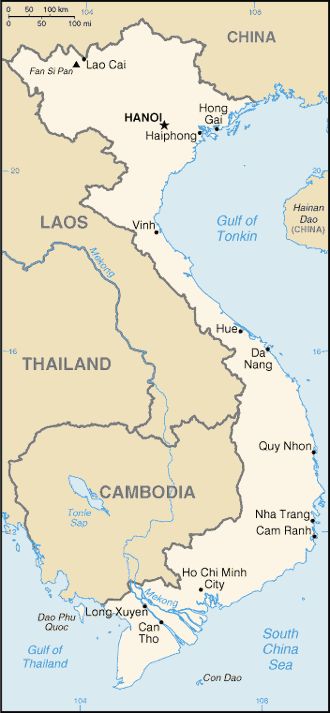|
VIETNAM
|
|
|
|
|
|
|
|
Vietnam is a country located in Southeastern Asia bordering the Gulf of Thailand, the Gulf of Tonkin, and the South China Sea. Neighboring countries include Cambodia, China, and Laos. The geography consists of hills and densely forested mountains in the northwest. The government system is a communist state; the chief of state is the president, and the head of government is the prime minister. Vietnam has a mixed economy in which there is limited private freedom, but the economy remains highly controlled by the government. Vietnam is a member of the Asia-Pacific Economic Cooperation (APEC), the Association of Southeast Asian Nations (ASEAN), and the Trans-Pacific Partnership (TPP).
The Socialist Republic of Vietnam remains a Communist dictatorship characterized by political repression and the absence of civil liberties. Economic liberalization began in 1986 with the doi moi reforms, and Vietnam joined the World Trade Organization in 2007. Economic growth was among the fastest in the world during the decade-long tenure of Prime Minister, Nguyễn Tấn Dũng but in 2016, after losing a contest for the highest position, that of General Secretary of the Communist Party of Vietnam, Dung was forced out. He was replaced as prime minister by Nguyễn Xuân Phúc. The economy is driven primarily by tourism and exports. In a major development, the U.S. lifted the long-standing arms embargo against Vietnam in 2016.
At a Glance:
|
Country Name
|
Socialist Republic of Vietnam
|
|
Area
|
3,31,210 sq.km
|
|
Capital
|
Hanoi (Ha Noi)
|
|
Government type
|
Communist state
|
|
Administrative divisions
|
58 provinces
|
|
National Holidays
|
Independence Day, 2 September
|
|
Fiscal year
|
Calendar Year
|
|
Currency
|
Dong (VND)
|
|
President
|
Mr. Tran Dai QUANG (since 2 April 2016)
|
|
Prime Minister
|
Mr. Nguyen Xuan PHUC (since 7 April 2016)
|
|
Population
|
96,160,163 (July 2017 est.)
|
|
Net migration rate
|
-0.3 migrant(s)/1,000 population (2016 est.)
|
|
GDP (purchasing power parity)
|
$595.5 billion (2016 est.)
|
|
GDP- composition by sector
|
Agriculture: 17 %
Industry: 39 %
Services: 44% (2015 est.)
|
|
Agriculture- Products
|
Rice, coffee, rubber, tea, pepper, soybeans, cashews, sugar cane, peanuts, bananas; pork; poultry; seafood
|
|
Industries
|
Food processing, garments, shoes, machine-building; mining, coal, steel; cement, chemical fertilizer, glass, tires, oil,mobile phones.
|
|
Major Exports
|
Clothes, shoes, electronics, seafood, crude oil, rice, coffee, wooden products, machinery
|
|
Major Exports - Partners
|
US 21%, China 13.2%, Japan 8.4%, South Korea 5.4%, Germany 4.1% (2015)
|
|
Major Imports |
Machinery and equipment, petroleum products, steel products, raw materials for the clothing and shoe industries, electronics, plastics, automobiles.
|
|
Major Importers - Partners |
China 34%, South Korea 14.2%, Singapore 6.5%, Japan 6.4%, Hong Kong 5.1%, Thailand 4.5% (2015)
|
|
Natural resources
|
Phosphates, coal, manganese, rare earth elements, bauxite, chromate, offshore oil and gas deposits, timber, hydropower, arable land
|
|
Languages
|
Vietnamese (official), English (increasingly favored as a second language), some French, Chinese, and Khmer, mountain area languages (Mon-Khmer and Malayo-Polynesian)
|
|
Ethnic groups
|
Kinh (Viet) 85.7%, Tay 1.9%, Thai 1.8%, Muong 1.5%, Khmer 1.5%, Mong 1.2%, Nung 1.1%, Hoa 1%, other 4.3% Note: 54 ethnic groups are recognized by the Vietnamese Government (2009 est.)
|
|
Climate
|
Tropical in south; monsoonal in north with hot, rainy season (May to September) and warm, dry season (October to March)
|
|
Location
|
South-eastern Asia, bordering the Gulf of Tonkin and South China Sea, as well as China, Laos and Cambodia
|

